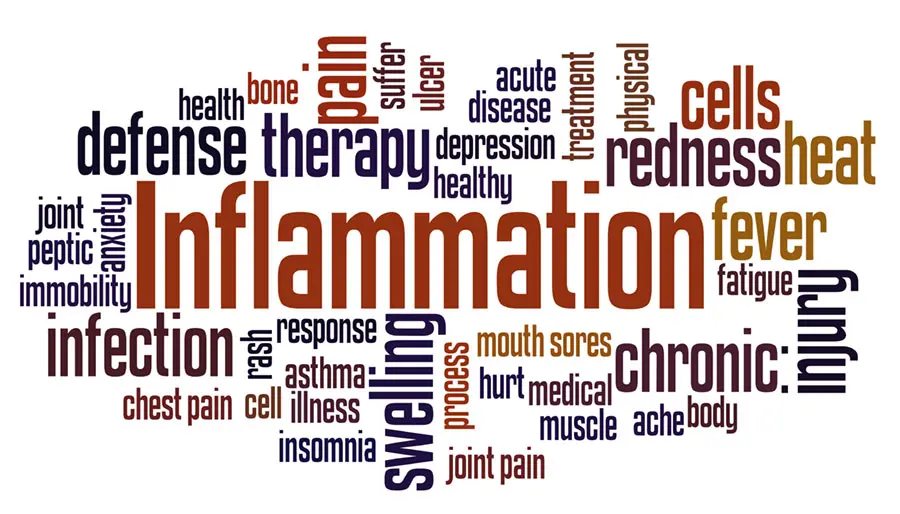by Krista-Lynn LandolfiAchy joints and digestive issues are accepted as an unavoidable part of aging, while the truth is, inflammation is often the cause of our discomfort. Chronic inflammation is the root cause of a wide variety of illnesses, including cancer, heart disease, diabetes, Alzheimer’s, autoimmune diseases, and even depression. A study by the British Journal of Nutrition determined unresolved inflammatory response is likely to be involved from the early stages of disease development.
Upwards of 70% of our immune system resides in our gut. When our microbiome is compromised by a poor diet, obesity, excessive consumption of alcohol, or chronic stress, it leads to gut permeability (leaky gut), which may cause systemic inflammation. When our body is dealing with inflammation, our immune response is lowered, making it harder to fight off common illnesses, like the flu, while creating an environment that breeds disease. Luckily, inflammation is a condition that can be reversed, most successfully, through dietary changes that include abstaining from inflammation-causing foods and adding anti-inflammatory foods to our diet.
As a nutritionist, I have found the most beneficial “medicine” to reduce inflammation is using food as our “farmacy”, and doctors who study nutrition agree. “Many experimental studies have shown that components of foods or beverages may have anti-inflammatory effects,” says Dr. Frank Hu, professor of nutrition and epidemiology in the Department of Nutrition at the Harvard School of Public Health. He goes on to say, “A healthy diet is beneficial not only for reducing the risk of chronic diseases but also for improving mood and overall quality of life.”
Recent data suggest that increased ingestion of fruits and vegetables leads to improved cognitive function and a reduced risk of age-related neurodegenerative diseases. Studies show that increased consumption of total flavonoids (from fruits and vegetables) was positively associated with a reduced rate of cognitive decline in adults aged 70 years and over. With life expectancies increasing every year, it’s important we take steps to ensure our quality of life, and diet is an excellent starting point!
Abstaining from certain types of food is a significant aspect of eating an anti-inflammatory diet. The following lists of foods will help you determine what to cut out of your diet and what to add.
Feeling a sense of deprivation can trigger the desire to overeat, so it may help to take thirty-days, or longer, to shift your plate to optimal nutrition slowly. Start each meal by replacing one inflammation-causing food with an anti-inflammatory alternative. Making exchanges will help you ease your way into a healthier lifestyle, i.e., opting for roasted potatoes instead of French fries.Inflammation Causing foods:
Avoid or limit these foods as much as possible:
- Synthetic ingredients, if you can’t pronounce the word, your body probably cannot process the ingredient
- Alcohol, one night of binge drinking, can trigger inflammation in your body.
- Red meat and processed meats, like steak, burgers, cold cuts, and hotdogs
- Refined carbohydrates found in white bread, cakes, cookies, and pastries
- Fast food, processed food, fried greasy foods
- Soda and other sugar-sweetened beverages
Anti-inflammatory foods
An anti-inflammatory diet includes these foods:
- Nuts, like walnuts, almonds, and macadamia nuts, which are high in healthy fats
- Fatty fish such as salmon, anchovies, and mackerel
- Fresh fruits and vegetables including, but in no way limited to broccoli, leafy greens like spinach and kale, berries, watermelon, and papaya
- Onions, garlic, and shallots, pre-biotic foods that nourish our microbiome
- Tomatoes, which are high in lycopene a component that reduces inflammation
Remember, when making significant dietary changes, it’s best to seek the guidance of a professional, like a nutritionist or registered dietician, who can clarify your specific needs and help you create healthy meal plans. If you sense inflammation might be compromising your health, it is important you consult with your doctor; a simple blood test can determine if inflammation is an issue.Krista-Lynn Landolfi is a freelance writer, master transformation coach (MCC) in practice since 1990, nutritionist, and mindfulness-based stress reduction instructor (MBSR) who has helped thousands of people create a life they love. Krista-Lynn is an expert whose “quality of life coaching” advice is featured in USA TODAY, Health Magazine, Oprah Magazine, and many more. Her dogs are her guru and death is her life coach. Watch her TEDx Talk, “How Death Taught Me to Live” for tips on living more fully. You can reach Krista-Lynn through her website, www.self-care.tips
